Research Proposal: Leadership and Mauritius Telecom Productivity
VerifiedAdded on 2022/09/09
|10
|1890
|24
Project
AI Summary
This research proposal examines the impact of effective leaders on the overall productivity of the Mauritius Telecom Company. The study aims to identify the factors influencing employee productivity, assess the impact of leadership on productivity, and recommend strategies to improve leadership for enhanced organizational performance. The research employs an interpretivist philosophy and an inductive approach, utilizing a mixed research design combining quantitative and qualitative methods. Data will be collected through surveys and secondary sources, with a simple random sampling method applied to select 100 employees. The research will employ statistical data analysis using SPSS and MS-Excel, ensuring ethical considerations such as consent, confidentiality, and plagiarism prevention. The proposal outlines a timeline for literature review, data collection, analysis, and report writing, referencing relevant literature on leadership, employee productivity, and organizational effectiveness.
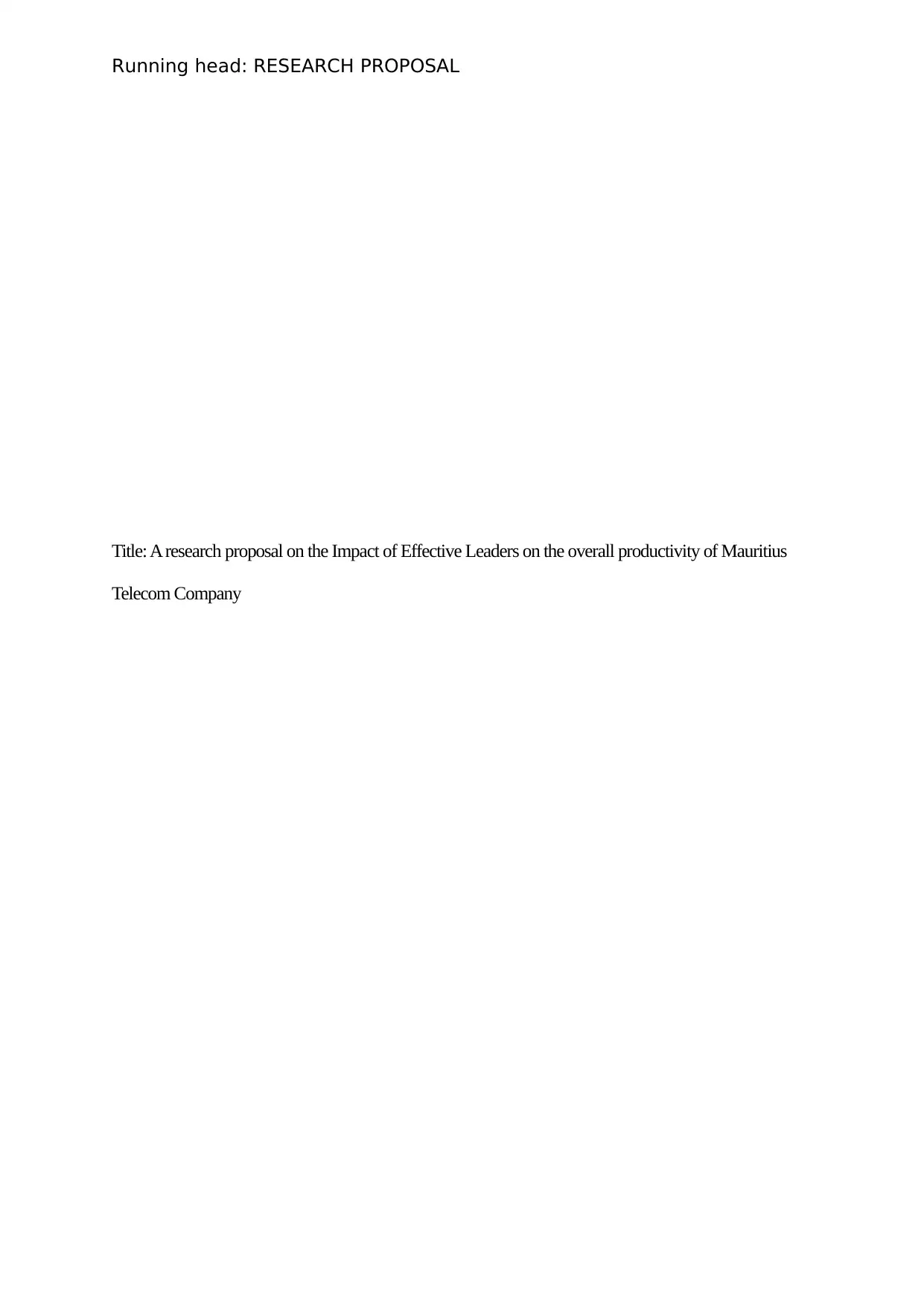
Running head: RESEARCH PROPOSAL
Title: A research proposal on the Impact of Effective Leaders on the overall productivity of Mauritius
Telecom Company
Title: A research proposal on the Impact of Effective Leaders on the overall productivity of Mauritius
Telecom Company
Paraphrase This Document
Need a fresh take? Get an instant paraphrase of this document with our AI Paraphraser
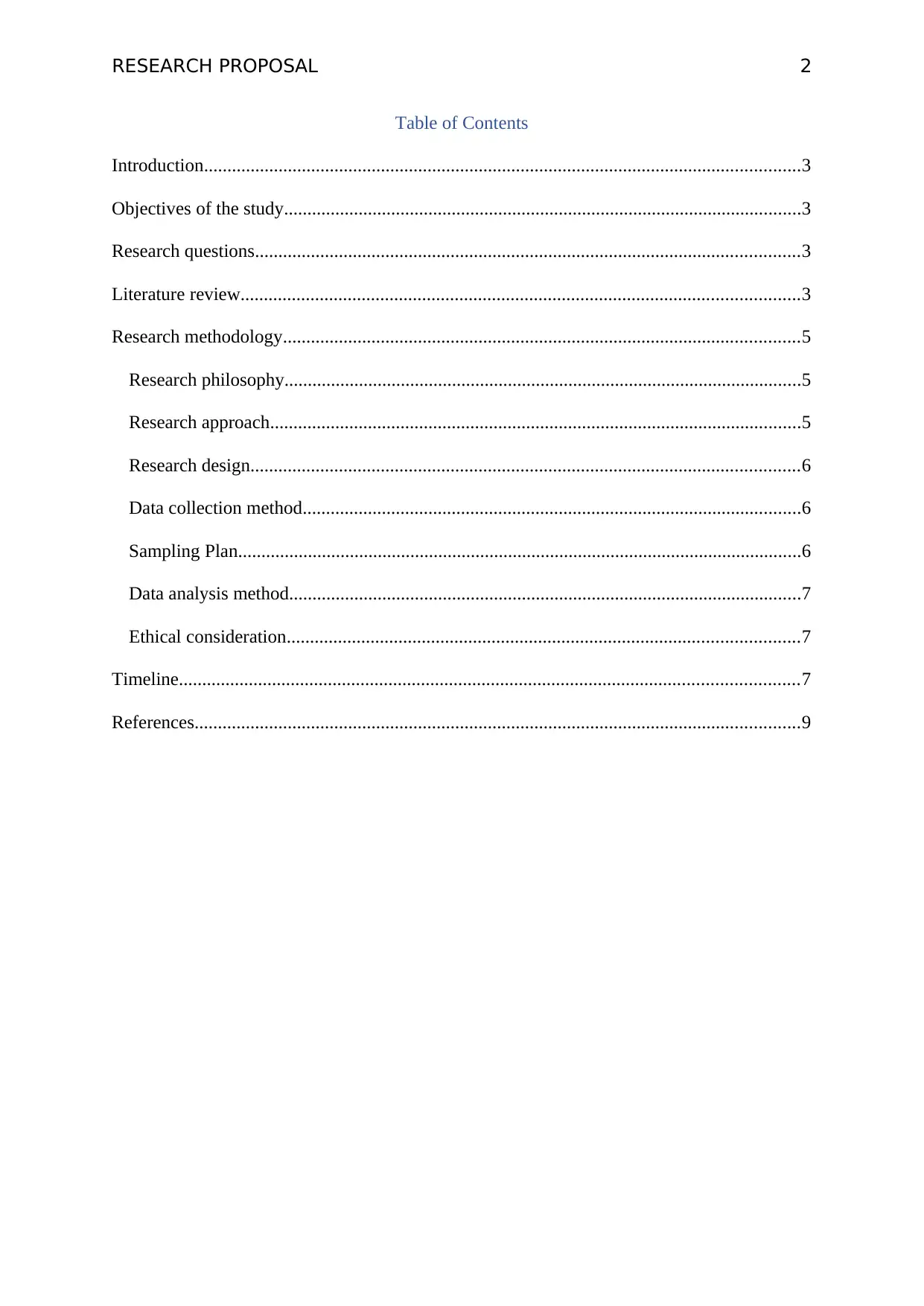
RESEARCH PROPOSAL 2
Table of Contents
Introduction................................................................................................................................3
Objectives of the study...............................................................................................................3
Research questions.....................................................................................................................3
Literature review........................................................................................................................3
Research methodology...............................................................................................................5
Research philosophy...............................................................................................................5
Research approach..................................................................................................................5
Research design......................................................................................................................6
Data collection method...........................................................................................................6
Sampling Plan.........................................................................................................................6
Data analysis method..............................................................................................................7
Ethical consideration..............................................................................................................7
Timeline.....................................................................................................................................7
References..................................................................................................................................9
Table of Contents
Introduction................................................................................................................................3
Objectives of the study...............................................................................................................3
Research questions.....................................................................................................................3
Literature review........................................................................................................................3
Research methodology...............................................................................................................5
Research philosophy...............................................................................................................5
Research approach..................................................................................................................5
Research design......................................................................................................................6
Data collection method...........................................................................................................6
Sampling Plan.........................................................................................................................6
Data analysis method..............................................................................................................7
Ethical consideration..............................................................................................................7
Timeline.....................................................................................................................................7
References..................................................................................................................................9
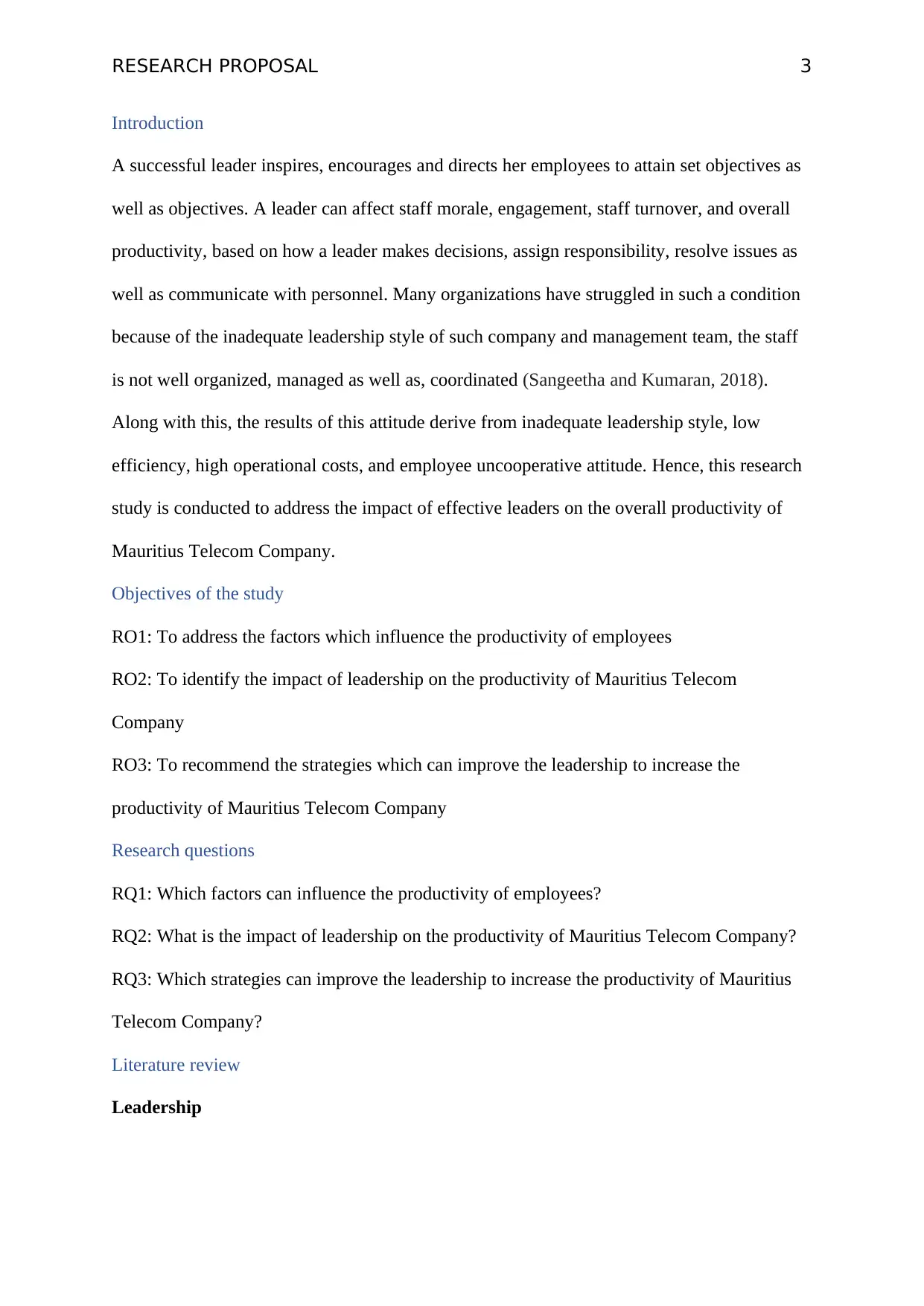
RESEARCH PROPOSAL 3
Introduction
A successful leader inspires, encourages and directs her employees to attain set objectives as
well as objectives. A leader can affect staff morale, engagement, staff turnover, and overall
productivity, based on how a leader makes decisions, assign responsibility, resolve issues as
well as communicate with personnel. Many organizations have struggled in such a condition
because of the inadequate leadership style of such company and management team, the staff
is not well organized, managed as well as, coordinated (Sangeetha and Kumaran, 2018).
Along with this, the results of this attitude derive from inadequate leadership style, low
efficiency, high operational costs, and employee uncooperative attitude. Hence, this research
study is conducted to address the impact of effective leaders on the overall productivity of
Mauritius Telecom Company.
Objectives of the study
RO1: To address the factors which influence the productivity of employees
RO2: To identify the impact of leadership on the productivity of Mauritius Telecom
Company
RO3: To recommend the strategies which can improve the leadership to increase the
productivity of Mauritius Telecom Company
Research questions
RQ1: Which factors can influence the productivity of employees?
RQ2: What is the impact of leadership on the productivity of Mauritius Telecom Company?
RQ3: Which strategies can improve the leadership to increase the productivity of Mauritius
Telecom Company?
Literature review
Leadership
Introduction
A successful leader inspires, encourages and directs her employees to attain set objectives as
well as objectives. A leader can affect staff morale, engagement, staff turnover, and overall
productivity, based on how a leader makes decisions, assign responsibility, resolve issues as
well as communicate with personnel. Many organizations have struggled in such a condition
because of the inadequate leadership style of such company and management team, the staff
is not well organized, managed as well as, coordinated (Sangeetha and Kumaran, 2018).
Along with this, the results of this attitude derive from inadequate leadership style, low
efficiency, high operational costs, and employee uncooperative attitude. Hence, this research
study is conducted to address the impact of effective leaders on the overall productivity of
Mauritius Telecom Company.
Objectives of the study
RO1: To address the factors which influence the productivity of employees
RO2: To identify the impact of leadership on the productivity of Mauritius Telecom
Company
RO3: To recommend the strategies which can improve the leadership to increase the
productivity of Mauritius Telecom Company
Research questions
RQ1: Which factors can influence the productivity of employees?
RQ2: What is the impact of leadership on the productivity of Mauritius Telecom Company?
RQ3: Which strategies can improve the leadership to increase the productivity of Mauritius
Telecom Company?
Literature review
Leadership
⊘ This is a preview!⊘
Do you want full access?
Subscribe today to unlock all pages.

Trusted by 1+ million students worldwide
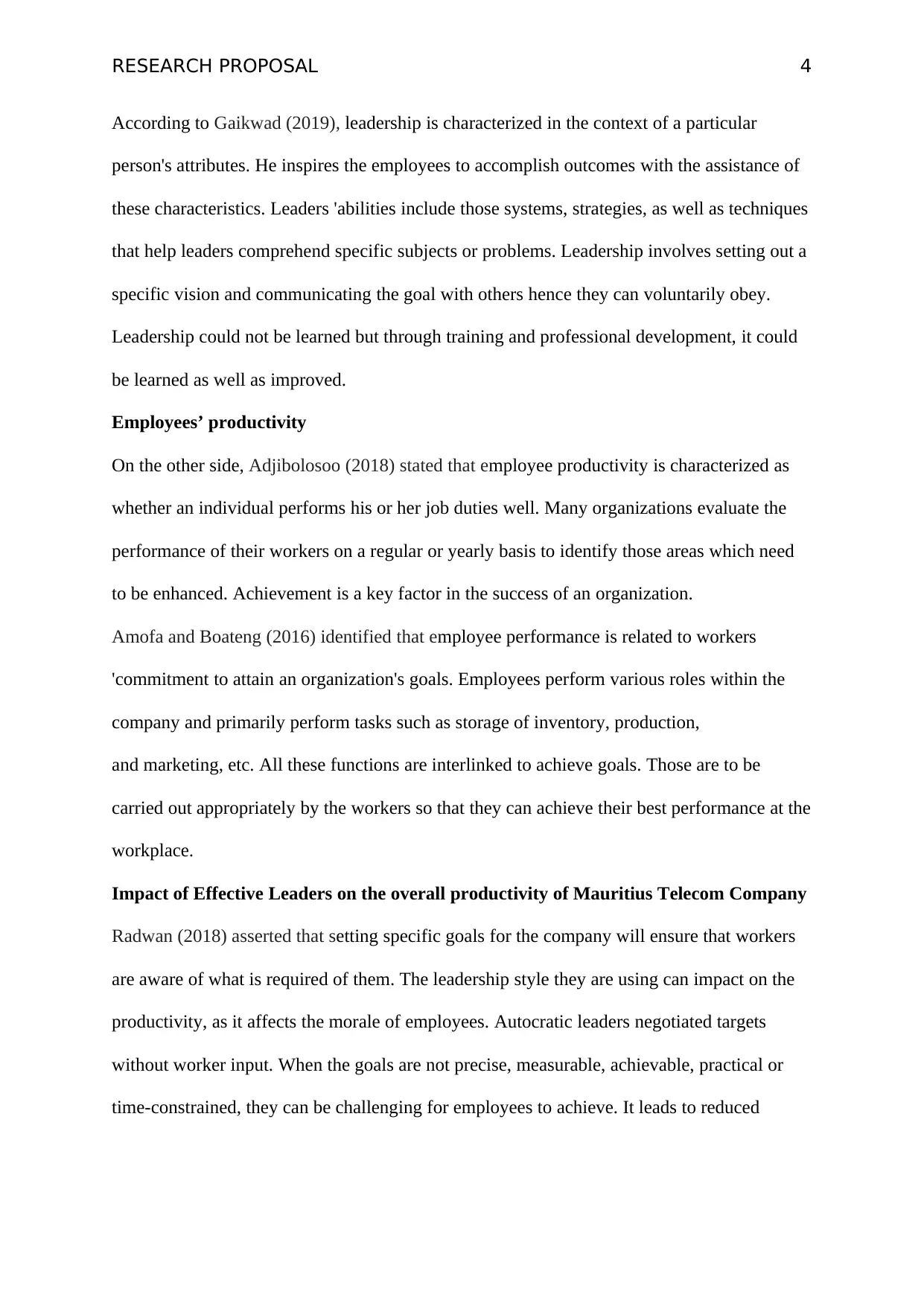
RESEARCH PROPOSAL 4
According to Gaikwad (2019), leadership is characterized in the context of a particular
person's attributes. He inspires the employees to accomplish outcomes with the assistance of
these characteristics. Leaders 'abilities include those systems, strategies, as well as techniques
that help leaders comprehend specific subjects or problems. Leadership involves setting out a
specific vision and communicating the goal with others hence they can voluntarily obey.
Leadership could not be learned but through training and professional development, it could
be learned as well as improved.
Employees’ productivity
On the other side, Adjibolosoo (2018) stated that employee productivity is characterized as
whether an individual performs his or her job duties well. Many organizations evaluate the
performance of their workers on a regular or yearly basis to identify those areas which need
to be enhanced. Achievement is a key factor in the success of an organization.
Amofa and Boateng (2016) identified that employee performance is related to workers
'commitment to attain an organization's goals. Employees perform various roles within the
company and primarily perform tasks such as storage of inventory, production,
and marketing, etc. All these functions are interlinked to achieve goals. Those are to be
carried out appropriately by the workers so that they can achieve their best performance at the
workplace.
Impact of Effective Leaders on the overall productivity of Mauritius Telecom Company
Radwan (2018) asserted that setting specific goals for the company will ensure that workers
are aware of what is required of them. The leadership style they are using can impact on the
productivity, as it affects the morale of employees. Autocratic leaders negotiated targets
without worker input. When the goals are not precise, measurable, achievable, practical or
time-constrained, they can be challenging for employees to achieve. It leads to reduced
According to Gaikwad (2019), leadership is characterized in the context of a particular
person's attributes. He inspires the employees to accomplish outcomes with the assistance of
these characteristics. Leaders 'abilities include those systems, strategies, as well as techniques
that help leaders comprehend specific subjects or problems. Leadership involves setting out a
specific vision and communicating the goal with others hence they can voluntarily obey.
Leadership could not be learned but through training and professional development, it could
be learned as well as improved.
Employees’ productivity
On the other side, Adjibolosoo (2018) stated that employee productivity is characterized as
whether an individual performs his or her job duties well. Many organizations evaluate the
performance of their workers on a regular or yearly basis to identify those areas which need
to be enhanced. Achievement is a key factor in the success of an organization.
Amofa and Boateng (2016) identified that employee performance is related to workers
'commitment to attain an organization's goals. Employees perform various roles within the
company and primarily perform tasks such as storage of inventory, production,
and marketing, etc. All these functions are interlinked to achieve goals. Those are to be
carried out appropriately by the workers so that they can achieve their best performance at the
workplace.
Impact of Effective Leaders on the overall productivity of Mauritius Telecom Company
Radwan (2018) asserted that setting specific goals for the company will ensure that workers
are aware of what is required of them. The leadership style they are using can impact on the
productivity, as it affects the morale of employees. Autocratic leaders negotiated targets
without worker input. When the goals are not precise, measurable, achievable, practical or
time-constrained, they can be challenging for employees to achieve. It leads to reduced
Paraphrase This Document
Need a fresh take? Get an instant paraphrase of this document with our AI Paraphraser
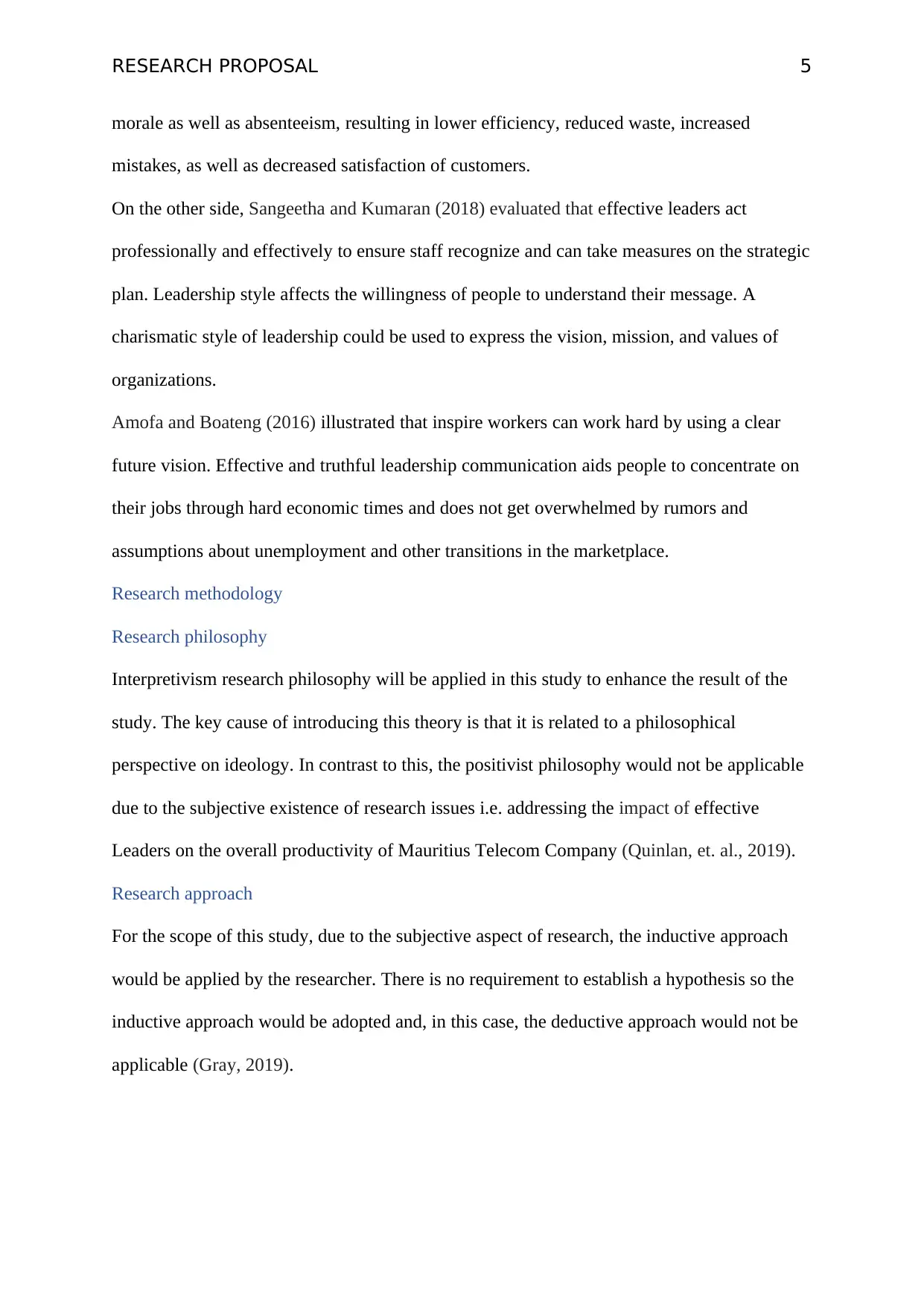
RESEARCH PROPOSAL 5
morale as well as absenteeism, resulting in lower efficiency, reduced waste, increased
mistakes, as well as decreased satisfaction of customers.
On the other side, Sangeetha and Kumaran (2018) evaluated that effective leaders act
professionally and effectively to ensure staff recognize and can take measures on the strategic
plan. Leadership style affects the willingness of people to understand their message. A
charismatic style of leadership could be used to express the vision, mission, and values of
organizations.
Amofa and Boateng (2016) illustrated that inspire workers can work hard by using a clear
future vision. Effective and truthful leadership communication aids people to concentrate on
their jobs through hard economic times and does not get overwhelmed by rumors and
assumptions about unemployment and other transitions in the marketplace.
Research methodology
Research philosophy
Interpretivism research philosophy will be applied in this study to enhance the result of the
study. The key cause of introducing this theory is that it is related to a philosophical
perspective on ideology. In contrast to this, the positivist philosophy would not be applicable
due to the subjective existence of research issues i.e. addressing the impact of effective
Leaders on the overall productivity of Mauritius Telecom Company (Quinlan, et. al., 2019).
Research approach
For the scope of this study, due to the subjective aspect of research, the inductive approach
would be applied by the researcher. There is no requirement to establish a hypothesis so the
inductive approach would be adopted and, in this case, the deductive approach would not be
applicable (Gray, 2019).
morale as well as absenteeism, resulting in lower efficiency, reduced waste, increased
mistakes, as well as decreased satisfaction of customers.
On the other side, Sangeetha and Kumaran (2018) evaluated that effective leaders act
professionally and effectively to ensure staff recognize and can take measures on the strategic
plan. Leadership style affects the willingness of people to understand their message. A
charismatic style of leadership could be used to express the vision, mission, and values of
organizations.
Amofa and Boateng (2016) illustrated that inspire workers can work hard by using a clear
future vision. Effective and truthful leadership communication aids people to concentrate on
their jobs through hard economic times and does not get overwhelmed by rumors and
assumptions about unemployment and other transitions in the marketplace.
Research methodology
Research philosophy
Interpretivism research philosophy will be applied in this study to enhance the result of the
study. The key cause of introducing this theory is that it is related to a philosophical
perspective on ideology. In contrast to this, the positivist philosophy would not be applicable
due to the subjective existence of research issues i.e. addressing the impact of effective
Leaders on the overall productivity of Mauritius Telecom Company (Quinlan, et. al., 2019).
Research approach
For the scope of this study, due to the subjective aspect of research, the inductive approach
would be applied by the researcher. There is no requirement to establish a hypothesis so the
inductive approach would be adopted and, in this case, the deductive approach would not be
applicable (Gray, 2019).
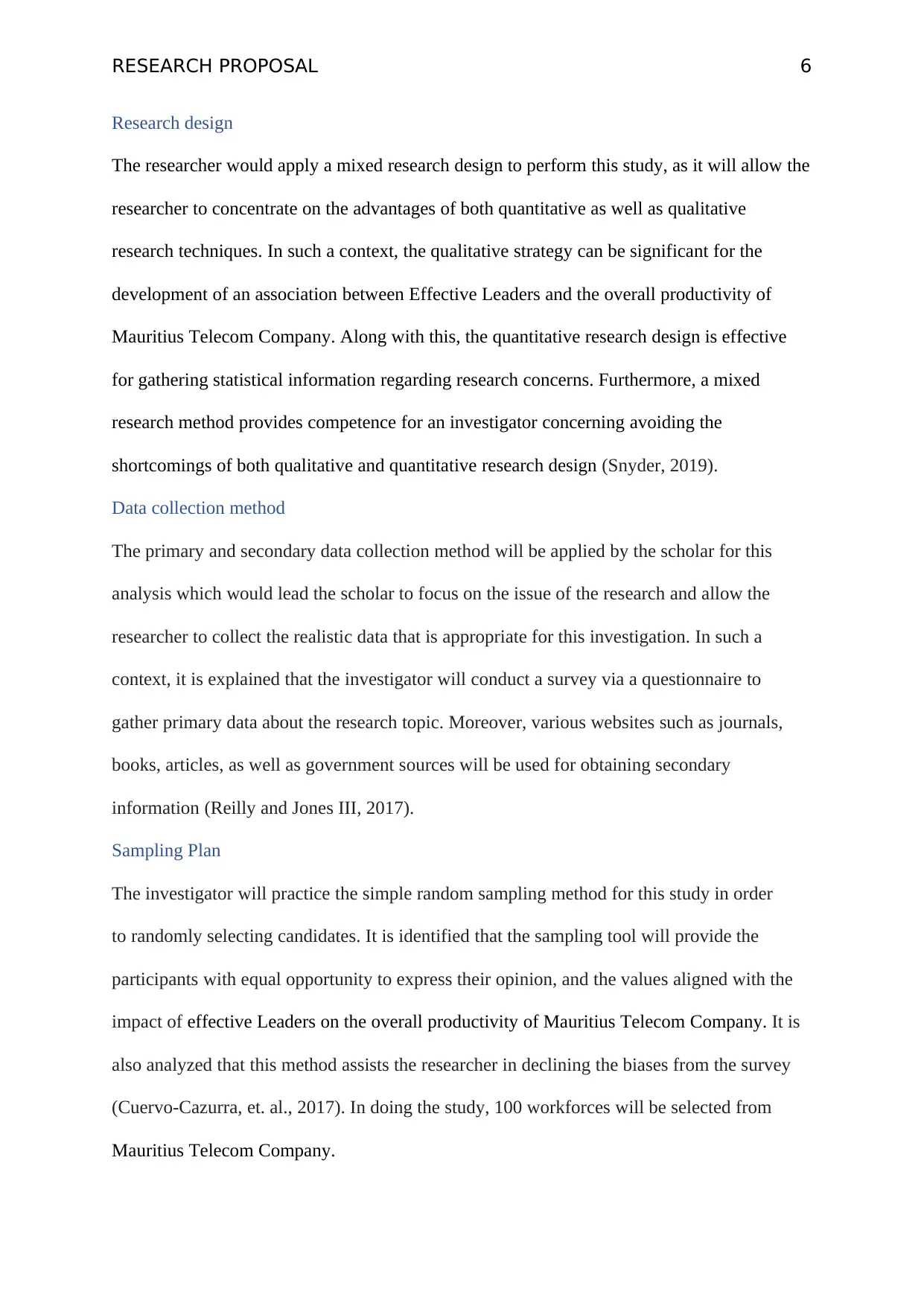
RESEARCH PROPOSAL 6
Research design
The researcher would apply a mixed research design to perform this study, as it will allow the
researcher to concentrate on the advantages of both quantitative as well as qualitative
research techniques. In such a context, the qualitative strategy can be significant for the
development of an association between Effective Leaders and the overall productivity of
Mauritius Telecom Company. Along with this, the quantitative research design is effective
for gathering statistical information regarding research concerns. Furthermore, a mixed
research method provides competence for an investigator concerning avoiding the
shortcomings of both qualitative and quantitative research design (Snyder, 2019).
Data collection method
The primary and secondary data collection method will be applied by the scholar for this
analysis which would lead the scholar to focus on the issue of the research and allow the
researcher to collect the realistic data that is appropriate for this investigation. In such a
context, it is explained that the investigator will conduct a survey via a questionnaire to
gather primary data about the research topic. Moreover, various websites such as journals,
books, articles, as well as government sources will be used for obtaining secondary
information (Reilly and Jones III, 2017).
Sampling Plan
The investigator will practice the simple random sampling method for this study in order
to randomly selecting candidates. It is identified that the sampling tool will provide the
participants with equal opportunity to express their opinion, and the values aligned with the
impact of effective Leaders on the overall productivity of Mauritius Telecom Company. It is
also analyzed that this method assists the researcher in declining the biases from the survey
(Cuervo‐Cazurra, et. al., 2017). In doing the study, 100 workforces will be selected from
Mauritius Telecom Company.
Research design
The researcher would apply a mixed research design to perform this study, as it will allow the
researcher to concentrate on the advantages of both quantitative as well as qualitative
research techniques. In such a context, the qualitative strategy can be significant for the
development of an association between Effective Leaders and the overall productivity of
Mauritius Telecom Company. Along with this, the quantitative research design is effective
for gathering statistical information regarding research concerns. Furthermore, a mixed
research method provides competence for an investigator concerning avoiding the
shortcomings of both qualitative and quantitative research design (Snyder, 2019).
Data collection method
The primary and secondary data collection method will be applied by the scholar for this
analysis which would lead the scholar to focus on the issue of the research and allow the
researcher to collect the realistic data that is appropriate for this investigation. In such a
context, it is explained that the investigator will conduct a survey via a questionnaire to
gather primary data about the research topic. Moreover, various websites such as journals,
books, articles, as well as government sources will be used for obtaining secondary
information (Reilly and Jones III, 2017).
Sampling Plan
The investigator will practice the simple random sampling method for this study in order
to randomly selecting candidates. It is identified that the sampling tool will provide the
participants with equal opportunity to express their opinion, and the values aligned with the
impact of effective Leaders on the overall productivity of Mauritius Telecom Company. It is
also analyzed that this method assists the researcher in declining the biases from the survey
(Cuervo‐Cazurra, et. al., 2017). In doing the study, 100 workforces will be selected from
Mauritius Telecom Company.
⊘ This is a preview!⊘
Do you want full access?
Subscribe today to unlock all pages.

Trusted by 1+ million students worldwide
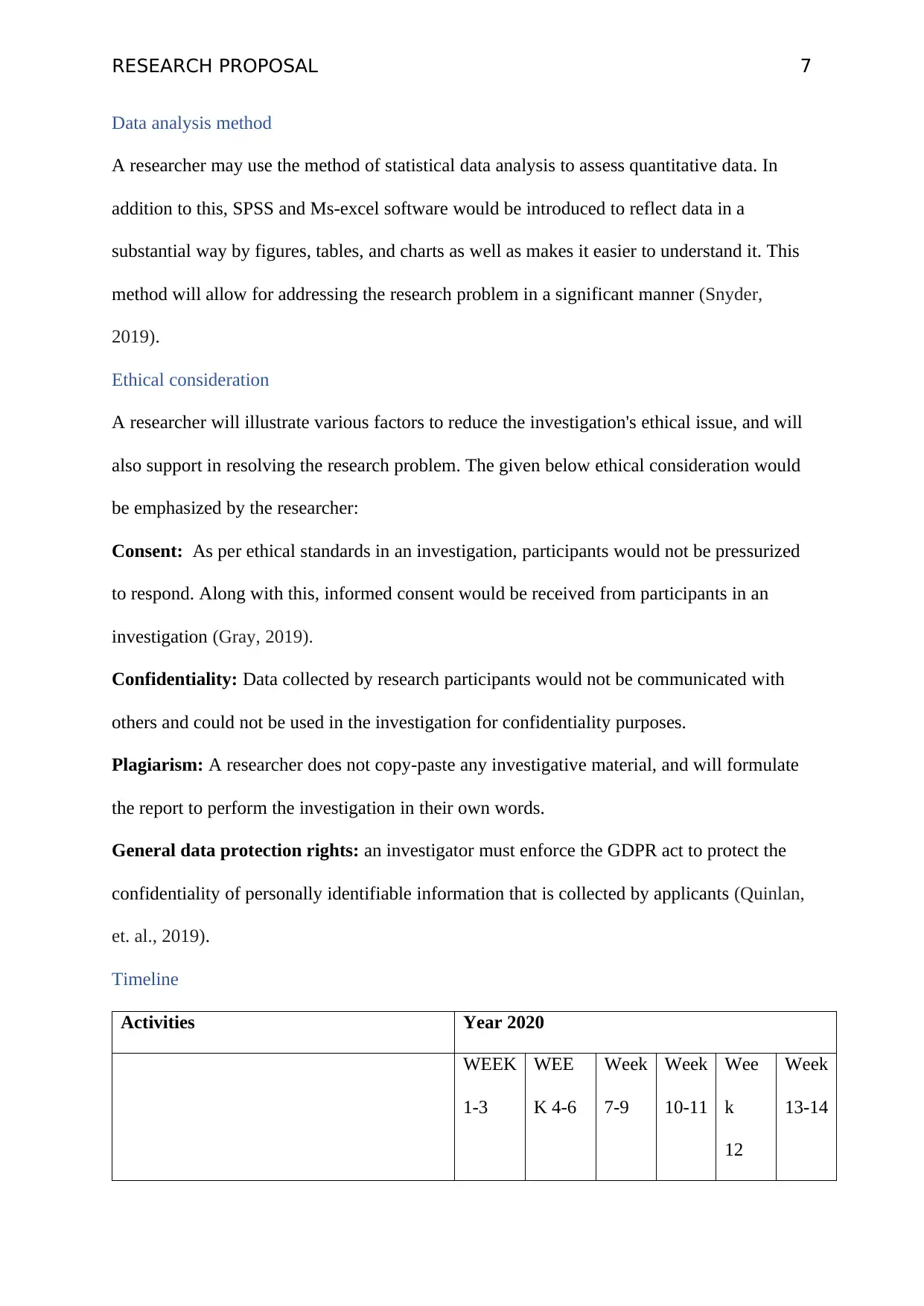
RESEARCH PROPOSAL 7
Data analysis method
A researcher may use the method of statistical data analysis to assess quantitative data. In
addition to this, SPSS and Ms-excel software would be introduced to reflect data in a
substantial way by figures, tables, and charts as well as makes it easier to understand it. This
method will allow for addressing the research problem in a significant manner (Snyder,
2019).
Ethical consideration
A researcher will illustrate various factors to reduce the investigation's ethical issue, and will
also support in resolving the research problem. The given below ethical consideration would
be emphasized by the researcher:
Consent: As per ethical standards in an investigation, participants would not be pressurized
to respond. Along with this, informed consent would be received from participants in an
investigation (Gray, 2019).
Confidentiality: Data collected by research participants would not be communicated with
others and could not be used in the investigation for confidentiality purposes.
Plagiarism: A researcher does not copy-paste any investigative material, and will formulate
the report to perform the investigation in their own words.
General data protection rights: an investigator must enforce the GDPR act to protect the
confidentiality of personally identifiable information that is collected by applicants (Quinlan,
et. al., 2019).
Timeline
Activities Year 2020
WEEK
1-3
WEE
K 4-6
Week
7-9
Week
10-11
Wee
k
12
Week
13-14
Data analysis method
A researcher may use the method of statistical data analysis to assess quantitative data. In
addition to this, SPSS and Ms-excel software would be introduced to reflect data in a
substantial way by figures, tables, and charts as well as makes it easier to understand it. This
method will allow for addressing the research problem in a significant manner (Snyder,
2019).
Ethical consideration
A researcher will illustrate various factors to reduce the investigation's ethical issue, and will
also support in resolving the research problem. The given below ethical consideration would
be emphasized by the researcher:
Consent: As per ethical standards in an investigation, participants would not be pressurized
to respond. Along with this, informed consent would be received from participants in an
investigation (Gray, 2019).
Confidentiality: Data collected by research participants would not be communicated with
others and could not be used in the investigation for confidentiality purposes.
Plagiarism: A researcher does not copy-paste any investigative material, and will formulate
the report to perform the investigation in their own words.
General data protection rights: an investigator must enforce the GDPR act to protect the
confidentiality of personally identifiable information that is collected by applicants (Quinlan,
et. al., 2019).
Timeline
Activities Year 2020
WEEK
1-3
WEE
K 4-6
Week
7-9
Week
10-11
Wee
k
12
Week
13-14
Paraphrase This Document
Need a fresh take? Get an instant paraphrase of this document with our AI Paraphraser
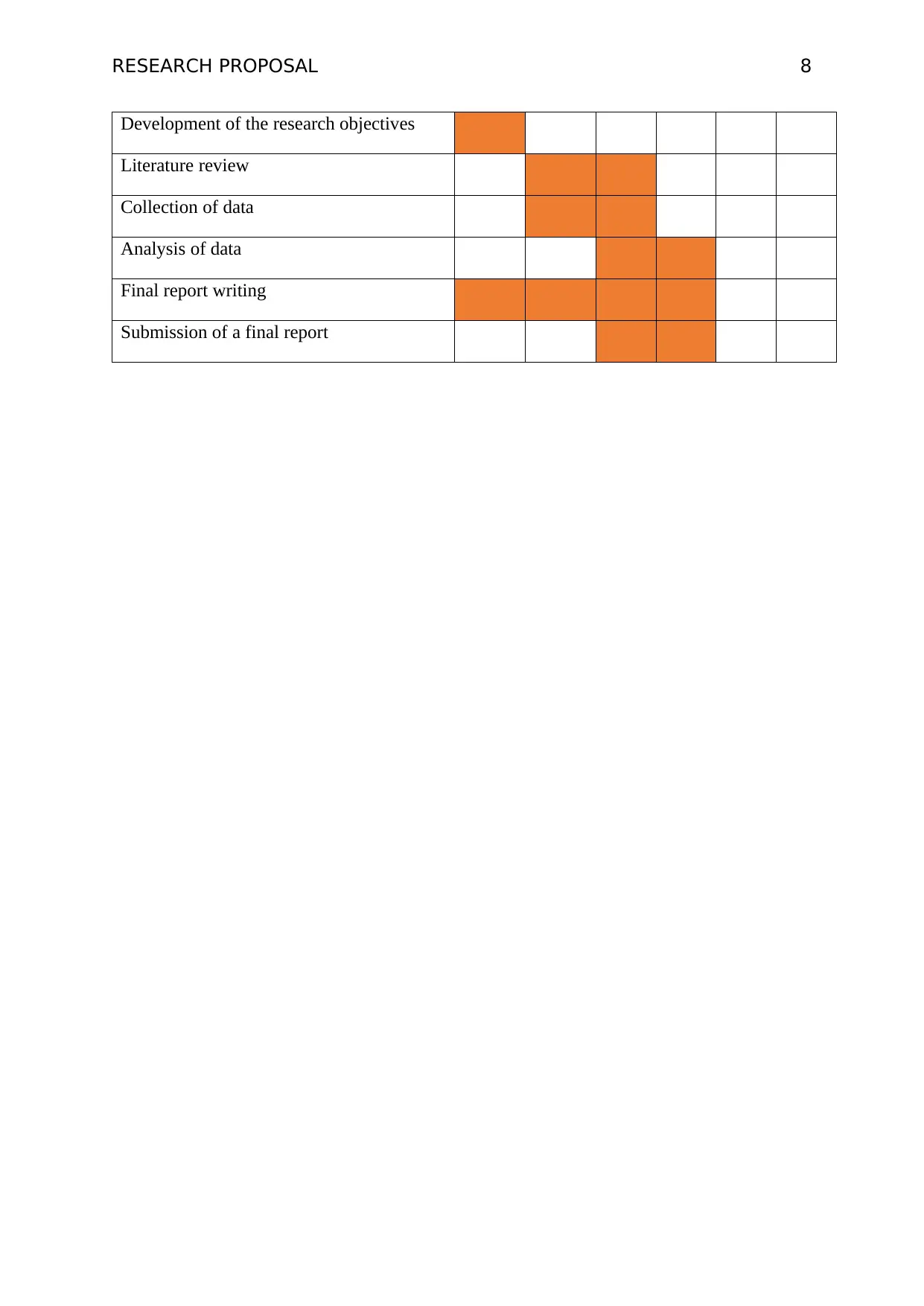
RESEARCH PROPOSAL 8
Development of the research objectives
Literature review
Collection of data
Analysis of data
Final report writing
Submission of a final report
Development of the research objectives
Literature review
Collection of data
Analysis of data
Final report writing
Submission of a final report
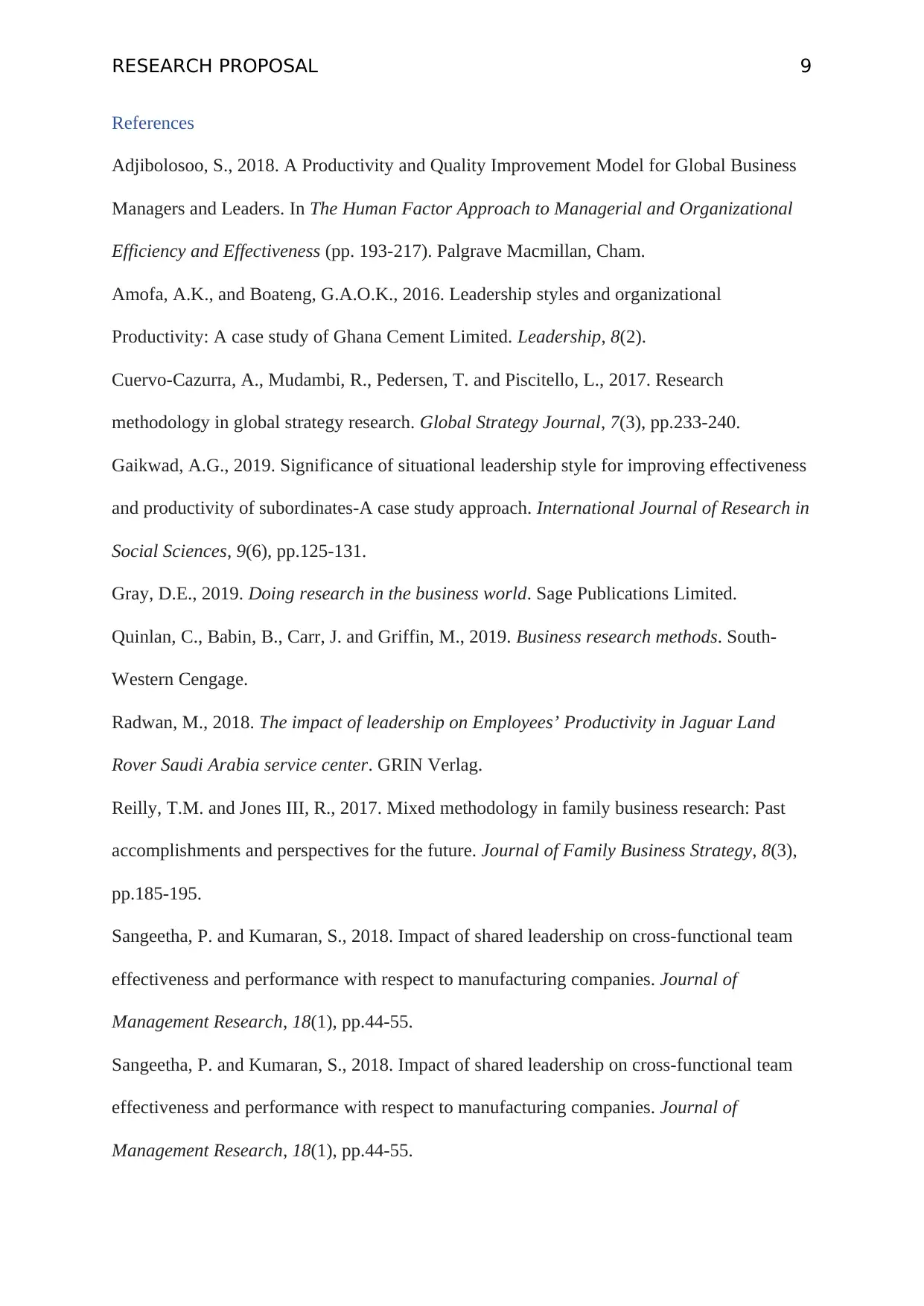
RESEARCH PROPOSAL 9
References
Adjibolosoo, S., 2018. A Productivity and Quality Improvement Model for Global Business
Managers and Leaders. In The Human Factor Approach to Managerial and Organizational
Efficiency and Effectiveness (pp. 193-217). Palgrave Macmillan, Cham.
Amofa, A.K., and Boateng, G.A.O.K., 2016. Leadership styles and organizational
Productivity: A case study of Ghana Cement Limited. Leadership, 8(2).
Cuervo‐Cazurra, A., Mudambi, R., Pedersen, T. and Piscitello, L., 2017. Research
methodology in global strategy research. Global Strategy Journal, 7(3), pp.233-240.
Gaikwad, A.G., 2019. Significance of situational leadership style for improving effectiveness
and productivity of subordinates-A case study approach. International Journal of Research in
Social Sciences, 9(6), pp.125-131.
Gray, D.E., 2019. Doing research in the business world. Sage Publications Limited.
Quinlan, C., Babin, B., Carr, J. and Griffin, M., 2019. Business research methods. South-
Western Cengage.
Radwan, M., 2018. The impact of leadership on Employees’ Productivity in Jaguar Land
Rover Saudi Arabia service center. GRIN Verlag.
Reilly, T.M. and Jones III, R., 2017. Mixed methodology in family business research: Past
accomplishments and perspectives for the future. Journal of Family Business Strategy, 8(3),
pp.185-195.
Sangeetha, P. and Kumaran, S., 2018. Impact of shared leadership on cross-functional team
effectiveness and performance with respect to manufacturing companies. Journal of
Management Research, 18(1), pp.44-55.
Sangeetha, P. and Kumaran, S., 2018. Impact of shared leadership on cross-functional team
effectiveness and performance with respect to manufacturing companies. Journal of
Management Research, 18(1), pp.44-55.
References
Adjibolosoo, S., 2018. A Productivity and Quality Improvement Model for Global Business
Managers and Leaders. In The Human Factor Approach to Managerial and Organizational
Efficiency and Effectiveness (pp. 193-217). Palgrave Macmillan, Cham.
Amofa, A.K., and Boateng, G.A.O.K., 2016. Leadership styles and organizational
Productivity: A case study of Ghana Cement Limited. Leadership, 8(2).
Cuervo‐Cazurra, A., Mudambi, R., Pedersen, T. and Piscitello, L., 2017. Research
methodology in global strategy research. Global Strategy Journal, 7(3), pp.233-240.
Gaikwad, A.G., 2019. Significance of situational leadership style for improving effectiveness
and productivity of subordinates-A case study approach. International Journal of Research in
Social Sciences, 9(6), pp.125-131.
Gray, D.E., 2019. Doing research in the business world. Sage Publications Limited.
Quinlan, C., Babin, B., Carr, J. and Griffin, M., 2019. Business research methods. South-
Western Cengage.
Radwan, M., 2018. The impact of leadership on Employees’ Productivity in Jaguar Land
Rover Saudi Arabia service center. GRIN Verlag.
Reilly, T.M. and Jones III, R., 2017. Mixed methodology in family business research: Past
accomplishments and perspectives for the future. Journal of Family Business Strategy, 8(3),
pp.185-195.
Sangeetha, P. and Kumaran, S., 2018. Impact of shared leadership on cross-functional team
effectiveness and performance with respect to manufacturing companies. Journal of
Management Research, 18(1), pp.44-55.
Sangeetha, P. and Kumaran, S., 2018. Impact of shared leadership on cross-functional team
effectiveness and performance with respect to manufacturing companies. Journal of
Management Research, 18(1), pp.44-55.
⊘ This is a preview!⊘
Do you want full access?
Subscribe today to unlock all pages.

Trusted by 1+ million students worldwide
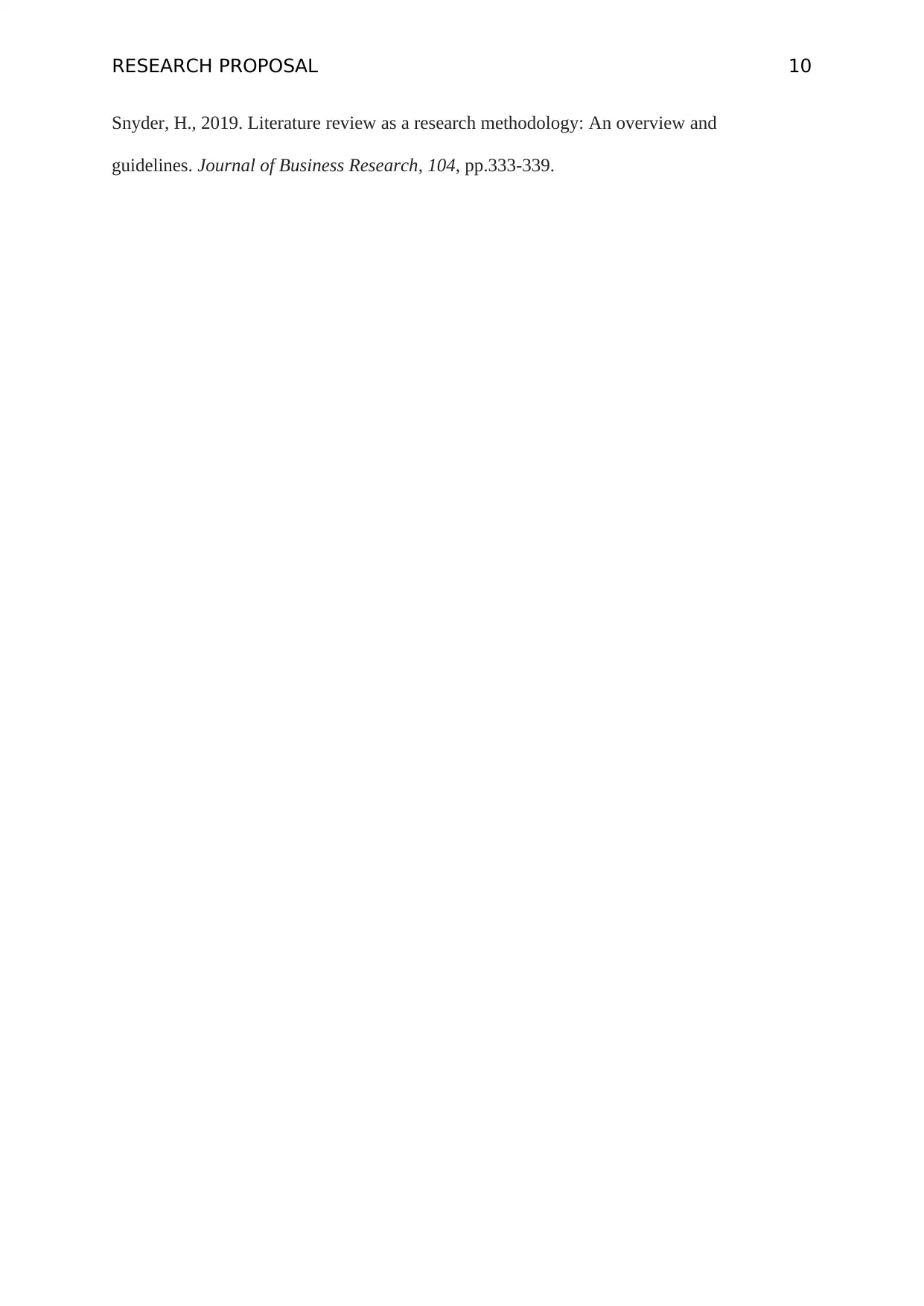
RESEARCH PROPOSAL 10
Snyder, H., 2019. Literature review as a research methodology: An overview and
guidelines. Journal of Business Research, 104, pp.333-339.
Snyder, H., 2019. Literature review as a research methodology: An overview and
guidelines. Journal of Business Research, 104, pp.333-339.
1 out of 10
Related Documents
Your All-in-One AI-Powered Toolkit for Academic Success.
+13062052269
info@desklib.com
Available 24*7 on WhatsApp / Email
![[object Object]](/_next/static/media/star-bottom.7253800d.svg)
Unlock your academic potential
Copyright © 2020–2026 A2Z Services. All Rights Reserved. Developed and managed by ZUCOL.




